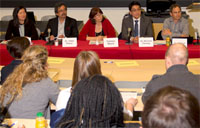A well attended, two-day professional development symposium created to give graduate students a competitive edge in their careers was held at York University last week.

Organized by Zoe Davis, a PhD student in earth and space sciences, and David Cappadocia, a PhD student in kinesiology and health science, the symposium took place May 21 and 22 at the Keele campus. Funded by the Natural Sciences and Engineering Research Council of Canada (NSERC), the symposium presented an opportunity for science and engineering graduate students to network with professionals in academia, industry and government. Workshops provided students with a forum to learn about, and build, the critical skills necessary for success in their future careers.
The event opened with welcome remarks from Faculty of Graduate Studies Dean Barbara Crow, who is York University’s associate vice-president graduate. In her remarks, Crow praised the students for their initiative in putting together the symposium.
A series of panel discussions and workshops rounded out the balance of the two days. Wednesday’s panel discussion focused on oral communication in a career context. It was designed to provide students with an understanding of the value of effective oral communication skills for specialist scientific audiences, non-specialist audiences and everything in between. As well, students learned about the importance of developing effective strategies and techniques for articulating a message and how to tailor that message to a specific audience. They learned how to translate key knowledge and skills in a career or business setting (for example, the power of an elevator pitch and why self-branding is important).

Following the panel discussion, students had a choice of two workshops. The first workshop addressed ways for researchers to turn academic research into clear language summaries, which are valuable tools that enable wider communication to different audiences who would benefit from the research. The second centred on the theme of time management and life balance. Students were introduced to core principles from the fields of time management and project management and shown how they could be applied to foster productivity, effectiveness and efficiency.

“I thought they did a great job bringing in experts from the academy and the wider public sector, including York graduates,” commented Crow after the first day’s events. “The experts were able to provide students a micro view of every day as well as the macro big picture of what they want to do with their education. They focused on skill development, communications and time management skills.”

Thursday’s sessions opened with a panel discussion on effective proposal writing for scientists, which focused on helping students improve their techniques for effective academic communications for use in writing grants, scholarship applications and papers. The panel covered the importance of developing strategies for job applications and how to enhance the ability to convey ideas in clear, concise and compelling language when writing reports or emails.
The panel discussion was followed by two workshops for students. The first focused on effective proposal writing for scientists and was led by Faculty of Science Professor Dawn Bazely. The workshop was designed to provide students with the tools to write clear and concise grant or scholarship applications. The second examined time management strategies for teaching assistants and was an interdisciplinary session that explored time management as an effective tool for designing highly effective labs and tutorials that promoted student engagement, persistence and motivation.
“We think it went incredibly well; we reached our goal. People really appreciated the first panel, appreciated the perspective of professionals,” said Davis. “They liked being able to ask what was it like.”


